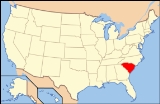
Outline of South Carolina
Encyclopedia
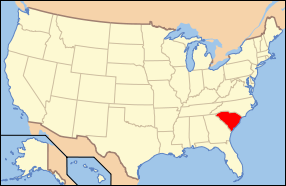
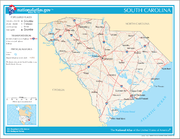
U.S. state
A U.S. state is any one of the 50 federated states of the United States of America that share sovereignty with the federal government. Because of this shared sovereignty, an American is a citizen both of the federal entity and of his or her state of domicile. Four states use the official title of...
of the United States of America. South Carolina borders the North Atlantic Ocean in the Southeastern United States
Southeastern United States
The Southeastern United States, colloquially referred to as the Southeast, is the eastern portion of the Southern United States. It is one of the most populous regions in the United States of America....
.
King Charles II of England
Charles II of England
Charles II was monarch of the three kingdoms of England, Scotland, and Ireland.Charles II's father, King Charles I, was executed at Whitehall on 30 January 1649, at the climax of the English Civil War...
granted eight Lords Proprietor a charter for a Province of Carolina
Province of Carolina
The Province of Carolina, originally chartered in 1629, was an English and later British colony of North America. Because the original Heath charter was unrealized and was ruled invalid, a new charter was issued to a group of eight English noblemen, the Lords Proprietors, in 1663...
on March 24, 1663. In 1712, the Lords Proprietor split the Province of Carolina into the Province of South Carolina
Province of South Carolina
The South Carolina Colony, or Province of South Carolina, was originally part of the Province of Carolina, which was chartered in 1663. The colony later became the U.S. state of South Carolina....
and the Province of North Carolina
Province of North Carolina
The Province of North Carolina was originally part of the Province of Carolina in British America, which was chartered by eight Lords Proprietor. The province later became the U.S. states of North Carolina and Tennessee....
. In 1720, the Province of South Carolina was made a royal colony.
South Carolina signed the United States Declaration of Independence
United States Declaration of Independence
The Declaration of Independence was a statement adopted by the Continental Congress on July 4, 1776, which announced that the thirteen American colonies then at war with Great Britain regarded themselves as independent states, and no longer a part of the British Empire. John Adams put forth a...
on July 4, 1776. The American states prevailed in the American War of Independence which concluded with the Treaty of Paris of 1783. South Carolina was the 8th of the original 13 states to approve the Constitution of the United States of America on May 23, 1788. On December 20, 1860, South Carolina became the first state to attempt to secede from the United States. On February 8, 1861, South Carolina and five other slave states formed the Confederate States of America
Confederate States of America
The Confederate States of America was a government set up from 1861 to 1865 by 11 Southern slave states of the United States of America that had declared their secession from the U.S...
. The Confederate States surrendered to the United States on April 9, 1865. South Carolina was readmitted to the Union
United States
The United States of America is a federal constitutional republic comprising fifty states and a federal district...
on July 9, 1868.
The following outline is provided as an overview of and topical guide to the U.S. state of South Carolina:
General reference
- Names
- Common name: South CarolinaSouth CarolinaSouth Carolina is a state in the Deep South of the United States that borders Georgia to the south, North Carolina to the north, and the Atlantic Ocean to the east. Originally part of the Province of Carolina, the Province of South Carolina was one of the 13 colonies that declared independence...
- Pronunciation: ˌsaʊθ kærəˈlaɪnə
- Official name: State of South Carolina
- Abbreviations and name codes
- Postal symbol: SC
- ISO 3166-2 code: US-SC
- InternetInternetThe Internet is a global system of interconnected computer networks that use the standard Internet protocol suite to serve billions of users worldwide...
second-level domainSecond-level domainIn the Domain Name System hierarchy, a second-level domain is a domain that is directly below a top-level domain . For example, in example.com, example is the second-level domain of the .com TLD....
: .sc.us
- Nicknames
- Palmetto StateSabal palmettoSabal palmetto, also known as cabbage palm, palmetto, cabbage palmetto, palmetto palm, blue palmetto, Carolina palmetto, common palmetto, swamp cabbage and sabal palm, is one of 15 species of palmetto palm . It is native to the southeastern United States, Cuba, and the Bahamas...
- Sandlapper State
- IodineIodineIodine is a chemical element with the symbol I and atomic number 53. The name is pronounced , , or . The name is from the , meaning violet or purple, due to the color of elemental iodine vapor....
Products State (in disuse) (previously used on license platesVehicle registration plates of South CarolinaThe state of South Carolina began requiring its citizens to register their vehicles and display license plates on their cars in 1917.-Passenger baseplates 1990 to present:-External links:**...
)
- Palmetto State
- Common name: South Carolina
- Adjectivals
- South CarolinaSouth CarolinaSouth Carolina is a state in the Deep South of the United States that borders Georgia to the south, North Carolina to the north, and the Atlantic Ocean to the east. Originally part of the Province of Carolina, the Province of South Carolina was one of the 13 colonies that declared independence...
- South Carolinian
- South Carolina
- Demonym: South Carolinian
Geography of South Carolina
- Main article: Geography of South Carolina
- South Carolina is: a U.S. stateU.S. stateA U.S. state is any one of the 50 federated states of the United States of America that share sovereignty with the federal government. Because of this shared sovereignty, an American is a citizen both of the federal entity and of his or her state of domicile. Four states use the official title of...
, a federal state of the United States of America - Location
- Northern hemisphereNorthern HemisphereThe Northern Hemisphere is the half of a planet that is north of its equator—the word hemisphere literally means “half sphere”. It is also that half of the celestial sphere north of the celestial equator...
- Western hemisphereWestern HemisphereThe Western Hemisphere or western hemisphere is mainly used as a geographical term for the half of the Earth that lies west of the Prime Meridian and east of the Antimeridian , the other half being called the Eastern Hemisphere.In this sense, the western hemisphere consists of the western portions...
- AmericasAmericasThe Americas, or America , are lands in the Western hemisphere, also known as the New World. In English, the plural form the Americas is often used to refer to the landmasses of North America and South America with their associated islands and regions, while the singular form America is primarily...
- North AmericaNorth AmericaNorth America is a continent wholly within the Northern Hemisphere and almost wholly within the Western Hemisphere. It is also considered a northern subcontinent of the Americas...
- Anglo America
- Northern AmericaNorthern AmericaNorthern America is the northernmost region of the Americas, and is part of the North American continent. It lies directly north of the region of Middle America; the land border between the two regions coincides with the border between the United States and Mexico...
- United States of America
- Contiguous United StatesContiguous United StatesThe contiguous United States are the 48 U.S. states on the continent of North America that are south of Canada and north of Mexico, plus the District of Columbia....
- Eastern United StatesEastern United StatesThe Eastern United States, the American East, or simply the East is traditionally defined as the states east of the Mississippi River. The first two tiers of states west of the Mississippi have traditionally been considered part of the West, but can be included in the East today; usually in...
- East Coast of the United StatesEast Coast of the United StatesThe East Coast of the United States, also known as the Eastern Seaboard, refers to the easternmost coastal states in the United States, which touch the Atlantic Ocean and stretch up to Canada. The term includes the U.S...
- Southeastern United StatesSoutheastern United StatesThe Southeastern United States, colloquially referred to as the Southeast, is the eastern portion of the Southern United States. It is one of the most populous regions in the United States of America....
- East Coast of the United States
- Southern United StatesSouthern United StatesThe Southern United States—commonly referred to as the American South, Dixie, or simply the South—constitutes a large distinctive area in the southeastern and south-central United States...
- Deep SouthDeep SouthThe Deep South is a descriptive category of the cultural and geographic subregions in the American South. Historically, it is differentiated from the "Upper South" as being the states which were most dependent on plantation type agriculture during the pre-Civil War period...
- Deep South
- Eastern United States
- Contiguous United States
- United States of America
- North America
- Americas
- Northern hemisphere
- Population of South Carolina: 4,625,364 (2010 U.S. Census)
- Area of South Carolina:
- Atlas of South Carolina
Places in South Carolina
- Historic places in South Carolina
- National Historic Landmarks in South Carolina
- National Register of Historic Places listings in South Carolina
- National Natural Landmarks in South Carolina
- National parks in South Carolina
- State parks in South Carolina
Environment of South Carolina
- Climate of South CarolinaClimate of South CarolinaSouth Carolina has a humid subtropical climate, with hot summers and winters that are not extremely cold. On average, between and of precipitation falls annually across the state...
- Protected areas in South Carolina
- Superfund sites in South Carolina
- Wildlife of South Carolina
- Fauna of South Carolina
- Birds of South Carolina
- Reptiles
- Snakes of South Carolina
- Fauna of South Carolina
Natural geographic features of South Carolina
- Rivers of South Carolina
Administrative divisions of South Carolina
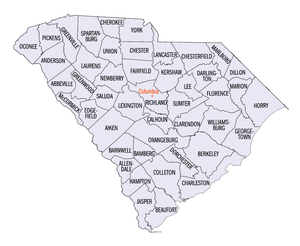
- The 46 Counties of the State of South Carolina
- Municipalities in South Carolina
- Cities in South Carolina
- State capital of South Carolina:
- City nicknames in South Carolina
- Towns in South Carolina
- Cities in South Carolina
- Census-designated places in South Carolina
- Municipalities in South Carolina
Government and politics of South Carolina
- Main article: Government of South Carolina and Politics of South CarolinaPolitics of South CarolinaPrior to the 1960s, the state Democratic Party was firmly in control of the government of South Carolina at all levels. The state Republican Party was little more than a country club group organized to reap the benefits when a Republican was in the White House...
- Form of governmentForm of governmentA form of government, or form of state governance, refers to the set of political institutions by which a government of a state is organized. Synonyms include "regime type" and "system of government".-Empirical and conceptual problems:...
: U.S. state governmentState governments of the United StatesState governments in the United States are those republics formed by citizens in the jurisdiction thereof as provided by the United States Constitution; with the original 13 States forming the first Articles of Confederation, and later the aforementioned Constitution. Within the U.S... - United States congressional delegations from South CarolinaUnited States Congressional Delegations from South CarolinaThese are tables of congressional delegations from South Carolina to the United States Senate and United States House of Representatives.-United States Senate:-United States House of Representatives:-See also:...
- South Carolina State Capitol
- Elections in South CarolinaElections in South Carolina-State and gubernatorial elections:*South Carolina gubernatorial elections*2006 state elections-Presidential elections:* 2004 general election* 2008 Democratic primary* 2008 Republican primary* 2008 general election-Other federal elections:...
- Political party strength in South CarolinaPolitical party strength in South CarolinaPolitical parties in South Carolina include the South Carolina Republican Party, the South Carolina Democratic Party, the South Carolina Green Party, and the Libertarian Party of South Carolina. The following table indicates the party of elected officials in the U.S...
Executive branch of the government of South Carolina
- Governor of South CarolinaGovernor of South CarolinaThe Governor of the State of South Carolina is the head of state for the State of South Carolina. Under the South Carolina Constitution, the Governor is also the head of government, serving as the chief executive of the South Carolina executive branch. The Governor is the ex officio...
- Lieutenant Governor of South Carolina
- Secretary of State of South CarolinaSecretary of State of South CarolinaThe Secretary of State of South Carolina is an elected position in the U.S. state of South Carolina.-Organization:The Secretary of State's office has four internal divisions:...
- State departments
- South Carolina Department of TransportationSouth Carolina Department of TransportationThe South Carolina Department of Transportation is a government agency in the US state of South Carolina. Its mission is to build and maintain roads and bridges and administer mass transit services....
- South Carolina Department of Transportation
Legislative branch of the government of South Carolina
- South Carolina General AssemblySouth Carolina General AssemblyThe South Carolina General Assembly, also called the South Carolina Legislature, is the state legislature of the U.S. state of South Carolina. The legislature is bicameral and consists of the lower South Carolina House of Representatives and the upper South Carolina Senate. Altogether, the General...
(bicameral)- Upper houseUpper houseAn upper house, often called a senate, is one of two chambers of a bicameral legislature, the other chamber being the lower house; a legislature composed of only one house is described as unicameral.- Possible specific characteristics :...
: South Carolina SenateSouth Carolina SenateThe South Carolina Senate is the upper house of the South Carolina General Assembly, the lower house being the South Carolina House of Representatives... - Lower houseLower houseA lower house is one of two chambers of a bicameral legislature, the other chamber being the upper house.Despite its official position "below" the upper house, in many legislatures worldwide the lower house has come to wield more power...
: South Carolina House of RepresentativesSouth Carolina House of RepresentativesThe South Carolina House of Representatives is the lower house of the South Carolina General Assembly, the upper house being the South Carolina Senate. It consists of 124 Representatives elected to two year terms at the same time as US Congressional elections...
- Upper house
Judicial branch of the government of South Carolina
- Supreme Court of South CarolinaSouth Carolina Supreme CourtThe South Carolina Supreme Court is the highest court in the U.S. state of South Carolina. The court is composed of a Chief Justice and four Associate Justices.-Selection of Justices:...
Law and order in South Carolina
Law of South Carolina- Capital punishment in South Carolina
- Constitution of South Carolina
- Crime in South CarolinaCrime in South Carolina-Statistics:In 2008 there were 214,374 crimes reported in South Carolina including 305 murders. A full list can be found -Capital punishment laws:Capital punishment is legal in this state...
- Gun laws in South Carolina
- Law enforcement in South Carolina
- Same-sex marriage in South Carolina
Military in South Carolina
- South Carolina Air National GuardSouth Carolina Air National GuardThe South Carolina Air National Guard is the air force militia of the U.S. state of South Carolina. It is, along with the South Carolina Army National Guard, an element of the South Carolina National Guard...
- South Carolina Army National GuardSouth Carolina Army National GuardThe South Carolina Army National Guard is a component of the United States Army and the United States National Guard. Nationwide, the Army National Guard comprises approximately one half of the US Army's available combat forces and approximately one third of its support organization...
History of South Carolina, by period
- Indigenous peoples
- SpanishSpainSpain , officially the Kingdom of Spain languages]] under the European Charter for Regional or Minority Languages. In each of these, Spain's official name is as follows:;;;;;;), is a country and member state of the European Union located in southwestern Europe on the Iberian Peninsula...
colony of FloridaSpanish FloridaSpanish Florida refers to the Spanish territory of Florida, which formed part of the Captaincy General of Cuba, the Viceroyalty of New Spain, and the Spanish Empire. Originally extending over what is now the southeastern United States, but with no defined boundaries, la Florida was a component of...
, 1565–1763 - EnglishEnglandEngland is a country that is part of the United Kingdom. It shares land borders with Scotland to the north and Wales to the west; the Irish Sea is to the north west, the Celtic Sea to the south west, with the North Sea to the east and the English Channel to the south separating it from continental...
Province of CarolinaProvince of CarolinaThe Province of Carolina, originally chartered in 1629, was an English and later British colony of North America. Because the original Heath charter was unrealized and was ruled invalid, a new charter was issued to a group of eight English noblemen, the Lords Proprietors, in 1663...
, 1663–1707 - FrenchFranceThe French Republic , The French Republic , The French Republic , (commonly known as France , is a unitary semi-presidential republic in Western Europe with several overseas territories and islands located on other continents and in the Indian, Pacific, and Atlantic oceans. Metropolitan France...
colony of LouisianeLouisiana (New France)Louisiana or French Louisiana was an administrative district of New France. Under French control from 1682–1763 and 1800–03, the area was named in honor of Louis XIV, by French explorer René-Robert Cavelier, Sieur de la Salle...
, 1699–1763 - BritishUnited KingdomThe United Kingdom of Great Britain and Northern IrelandIn the United Kingdom and Dependencies, other languages have been officially recognised as legitimate autochthonous languages under the European Charter for Regional or Minority Languages...
Province of CarolinaProvince of CarolinaThe Province of Carolina, originally chartered in 1629, was an English and later British colony of North America. Because the original Heath charter was unrealized and was ruled invalid, a new charter was issued to a group of eight English noblemen, the Lords Proprietors, in 1663...
, 1707–1712 - BritishUnited KingdomThe United Kingdom of Great Britain and Northern IrelandIn the United Kingdom and Dependencies, other languages have been officially recognised as legitimate autochthonous languages under the European Charter for Regional or Minority Languages...
Province of South CarolinaProvince of South CarolinaThe South Carolina Colony, or Province of South Carolina, was originally part of the Province of Carolina, which was chartered in 1663. The colony later became the U.S. state of South Carolina....
, 1712–1776 - French and Indian WarFrench and Indian WarThe French and Indian War is the common American name for the war between Great Britain and France in North America from 1754 to 1763. In 1756, the war erupted into the world-wide conflict known as the Seven Years' War and thus came to be regarded as the North American theater of that war...
, 1754–1763- Treaty of Fontainebleau of 1762Treaty of Fontainebleau (1762)The Treaty of Fontainebleau was a secret agreement in which France ceded Louisiana to Spain. The treaty followed the last battle in the French and Indian War, the Battle of Signal Hill in September 1762, which confirmed British control of Canada. However, the associated Seven Years War continued...
- Treaty of Paris of 1763Treaty of Paris (1763)The Treaty of Paris, often called the Peace of Paris, or the Treaty of 1763, was signed on 10 February 1763, by the kingdoms of Great Britain, France and Spain, with Portugal in agreement. It ended the French and Indian War/Seven Years' War...
- Treaty of Fontainebleau of 1762
- BritishUnited KingdomThe United Kingdom of Great Britain and Northern IrelandIn the United Kingdom and Dependencies, other languages have been officially recognised as legitimate autochthonous languages under the European Charter for Regional or Minority Languages...
Indian ReserveIndian Reserve (1763)The Indian Reserve was a territory under British rule in North America set aside in the Royal Proclamation of 1763 for use by American Indians between 1763 and 1783....
, 1763–1783- Royal Proclamation of 1763Royal Proclamation of 1763The Royal Proclamation of 1763 was issued October 7, 1763, by King George III following Great Britain's acquisition of French territory in North America after the end of the French and Indian War/Seven Years' War...
- Royal Proclamation of 1763
- American Revolutionary WarAmerican Revolutionary WarThe American Revolutionary War , the American War of Independence, or simply the Revolutionary War, began as a war between the Kingdom of Great Britain and thirteen British colonies in North America, and ended in a global war between several European great powers.The war was the result of the...
, April 19, 1775 – September 3, 1783- Treaty of ParisTreaty of Paris (1783)The Treaty of Paris, signed on September 3, 1783, ended the American Revolutionary War between Great Britain on the one hand and the United States of America and its allies on the other. The other combatant nations, France, Spain and the Dutch Republic had separate agreements; for details of...
, September 3, 1783
- Treaty of Paris
- State of South Carolina since 1776
-
- Adopts a constitutionConstitutionA constitution is a set of fundamental principles or established precedents according to which a state or other organization is governed. These rules together make up, i.e. constitute, what the entity is...
for an independent State of South Carolina, March 15, 1776
- Adopts a constitution
- United States Declaration of IndependenceUnited States Declaration of IndependenceThe Declaration of Independence was a statement adopted by the Continental Congress on July 4, 1776, which announced that the thirteen American colonies then at war with Great Britain regarded themselves as independent states, and no longer a part of the British Empire. John Adams put forth a...
, July 4, 1776 - Chickamauga WarsChickamauga warsThe Chickamauga Wars were a series of raids, campaigns, ambushes, minor skirmishes, and several full-scale frontier battles which were a continuation of the Cherokee struggle against encroachment by American frontiersmen from the former British colonies...
, 1776–1794- Second state to ratify the Articles of Confederation and Perpetual Union, signed July 9, 1778
- Western territorial claimsState cessionsThe state cessions are those areas of the United States that the separate states ceded to the federal government in the late 18th and early 19th century...
ceded 1787 - Eighth State to ratify the Constitution of the United States of America on May 23, 1788
- War of 1812War of 1812The War of 1812 was a military conflict fought between the forces of the United States of America and those of the British Empire. The Americans declared war in 1812 for several reasons, including trade restrictions because of Britain's ongoing war with France, impressment of American merchant...
, June 18, 1812 – March 23, 1815- Treaty of GhentTreaty of GhentThe Treaty of Ghent , signed on 24 December 1814, in Ghent , was the peace treaty that ended the War of 1812 between the United States of America and the United Kingdom of Great Britain and Ireland...
, December 24, 1814
- Treaty of Ghent
- Andrew JacksonAndrew JacksonAndrew Jackson was the seventh President of the United States . Based in frontier Tennessee, Jackson was a politician and army general who defeated the Creek Indians at the Battle of Horseshoe Bend , and the British at the Battle of New Orleans...
becomes seventh President of the United StatesPresident of the United StatesThe President of the United States of America is the head of state and head of government of the United States. The president leads the executive branch of the federal government and is the commander-in-chief of the United States Armed Forces....
on March 4, 1829 - Mexican-American War, April 25, 1846 – February 2, 1848
- First state to declare secession from the United States on December 20, 1860
- Founding state of the Confederate States of AmericaConfederate States of AmericaThe Confederate States of America was a government set up from 1861 to 1865 by 11 Southern slave states of the United States of America that had declared their secession from the U.S...
on February 8, 1861
- American Civil WarAmerican Civil WarThe American Civil War was a civil war fought in the United States of America. In response to the election of Abraham Lincoln as President of the United States, 11 southern slave states declared their secession from the United States and formed the Confederate States of America ; the other 25...
, April 12, 1861 – May 13, 1865- South Carolina in the American Civil War
- Battle of Fort SumterBattle of Fort SumterThe Battle of Fort Sumter was the bombardment and surrender of Fort Sumter, near Charleston, South Carolina, that started the American Civil War. Following declarations of secession by seven Southern states, South Carolina demanded that the U.S. Army abandon its facilities in Charleston Harbor. On...
, April 12–13, 1861 - Carolinas CampaignCarolinas CampaignThe Carolinas Campaign was the final campaign in the Western Theater of the American Civil War. In January 1865, Union Maj. Gen. William Tecumseh Sherman advanced north from Savannah, Georgia, through the Carolinas, with the intention of linking up with Union forces in Virginia. The defeat of ...
, January 5 – April 26, 1865
- Battle of Fort Sumter
- South Carolina in the American Civil War
- South Carolina in Reconstruction, 1865–1868
- Fifth former Confederate state readmitted to the United States on July 9, 1868
-
Culture of South Carolina
Culture of South Carolina- Museums in South Carolina
- Religion in South Carolina
- The Church of Jesus Christ of Latter-day Saints in South CarolinaThe Church of Jesus Christ of Latter-day Saints in South CarolinaAs of year-end 2007, The Church of Jesus Christ of Latter-day Saints reported 36,141 members in 6 stakes, 46 wards, 14 branches, 1 mission, and 1 temple in South Carolina.-History:...
- Episcopal Diocese of South CarolinaEpiscopal Diocese of South CarolinaThe Episcopal Diocese of South Carolina is a diocese of the Episcopal Church in the United States of America covering an area of 24 counties in the eastern part of the state of South Carolina. Its see city is Charleston, home to the Cathedral of St. Luke and St. Paul and Diocesan House. There are...
- The Church of Jesus Christ of Latter-day Saints in South Carolina
- Scouting in South CarolinaScouting in South CarolinaScouting in South Carolina has a long history, from the 1910s to the present day, serving thousands of youth in programs that suit the environment in which they live.-Early history :...
- State symbols of South Carolina
- Flag of the State of South Carolina

- Great Seal of the State of South Carolina
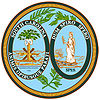
- Flag of the State of South Carolina
Economy and infrastructure of South Carolina
- Main article: Economy of South Carolina
- Communications in South Carolina
- Health care in South Carolina
- Transportation in South Carolina
Education in South Carolina
- Main article: Education in South Carolina
- Schools in South Carolina
- School districts in South Carolina
- Colleges and universities in South Carolina
- University of South CarolinaUniversity of South CarolinaThe University of South Carolina is a public, co-educational research university located in Columbia, South Carolina, United States, with 7 surrounding satellite campuses. Its historic campus covers over in downtown Columbia not far from the South Carolina State House...
- South Carolina State UniversitySouth Carolina State UniversitySouth Carolina State University is a historically black university located in Orangeburg, South Carolina, United States. It is the only state funded, historically black land-grant institution in South Carolina and is a member school of the Thurgood Marshall Scholarship Fund.- Colleges, departments,...
- University of South Carolina
See also
- Outline of geographyOutline of geographyThe following outline is provided as an overview of and topical guide to geography:Geography – science that studies the lands, features, inhabitants, and phenomena of Earth.- Geography is :...
- Outline of the United States
- Index of South Carolina-related articles
- Outline of the United States

